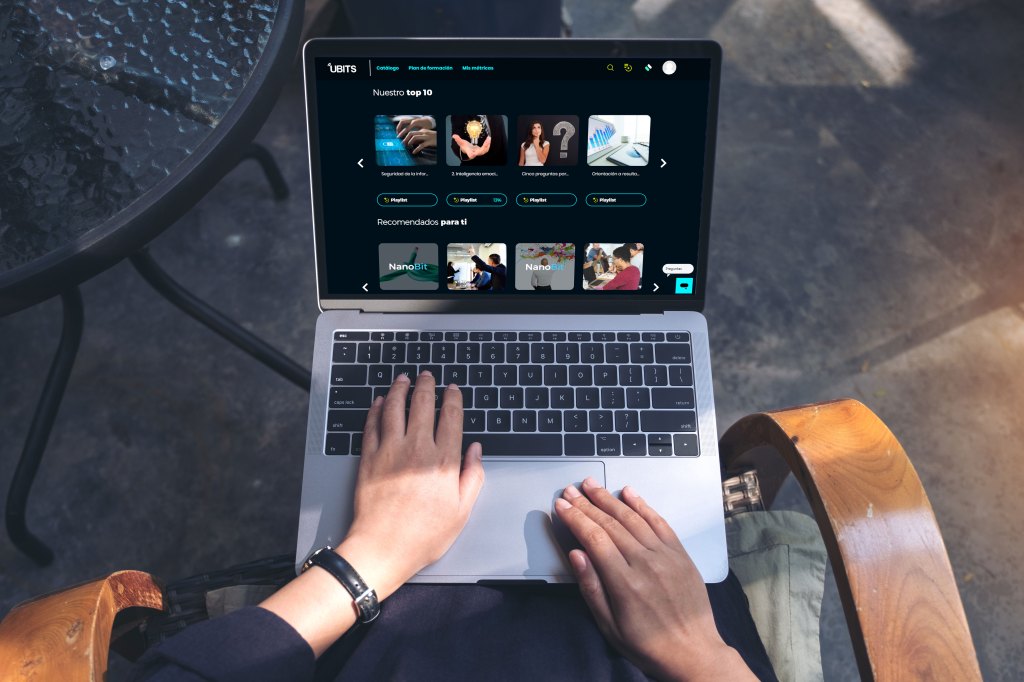UBITS, a B2B online learning platform for upskilling employees in Latin America, has raised $25 million in funding led by Riverwood Capital.
Julián Melo and Marta Forero founded UBITS in Bogota, Colombia, in 2018 after the pair came up with the idea of “creating the Netflix for corporate training for LatAm.” They applied to Y Combinator, raised a seed round and went back to Colombia to create a program and courses that launched in January 2019.
“In the beginning, we had 30 to 40 courses and the technology was not that good,” Melo admits. “Today, we have over 750 courses, which we believe is the largest catalog of corporate training available in Spanish today, as well as great features that help students apply what they learn.”
The startup also today has a “very powerful dashboard,” according to Melo, where companies can track all the learning analytics and see the number of courses, completion rates, ranking of courses and a number of other metrics. UBITS is also working on further personalizing its offering so that each employee has his/her own training path.
“We get to help them grow individually and in their career,” Melo said.
Over the past two years, UBITS has grown its revenue by “more than 8x” and now works with hundreds of enterprises, such as Mercado Libre, Siemens and Kimberly Clark. In 2021, revenue grew by “2.5x” and more than tripled its number of customers — from 110 to nearly 350. At the end of 2021, almost 100,000 students had used its platform, up from 28,000 the year prior. The startup has also partnered with Coursera to provide access to UBITS courses in the B2C market.
“Our goal is to have over 1,000 enterprise and midmarket customers and more than 1 million students using the platform by the end of 2022,” Melo told TechCrunch.”
Besides Riverwood, edtech-focused Owl Ventures (which led its $5 million Series A round last June), Endeavor Catalyst and Roble Ventures also participated in the financing. The company also received a strategic investment from Stanford University.

UBITS offers companies an annual subscription per user so that they pay to give their employees unlimited access to a virtual content library and live sessions. The employees can choose from lessons that focus on a range of skills — from soft to technical, such as leadership, sales and commercial capabilities, technology training and education, among others.
The startup also partners with “top local experts” to offer micro courses and live classes. Companies can then monitor and analyze KPIs and customize their employees’ learning journey.
“We’re personalizing the experience with algorithms based on AI so that we can recommend adequate courses and content to each person depending on their behavior on the platform,” Melo said.
Over the years, UBITS has expanded to Mexico and Peru and, in fact, it now has dual headquarters in Mexico, where its two co-founders now live. To date, students have completed over 600,000 courses on its platform. The startup plans to use its new capital to enhance “its proprietary content” and add more than 2,000 new courses, continue to build out AI-based functionalities and launch in new locations such as Chile, Spain and other Spanish-speaking markets. It also plans to double its team of 280 this year.
“Our main goal is to create more content, improve technology and hire more engineers and people creating content, as well as people in product development, sales and customer success. We want to not only bring more customers but also retain and expand them.”
Francisco Alvarez-Demalde, co-founder and managing partner of Riverwood Capital, believes UBITS has developed a “disruptive employee-centric corporate learning platform with an engaging Spanish language offering that includes much-needed content for employees to advance in their professional journey and grow with their companies, while improving retention, productivity, and business outcomes.”
Federico Storani, executive director of Riverwood Capital, is joining UBITS’ board as part of the financing. He believes that one of the startup’s biggest strengths is that its “upskilling material is approachable and addresses a clear gap in the market for employees of all levels across enterprises and mid-market companies in the region.”
“LatAm has the largest skills gap in the world. We want to solve this problem to help people grow, so companies will grow, and there will be a better society and economy in the region,” said Melo.































Comment